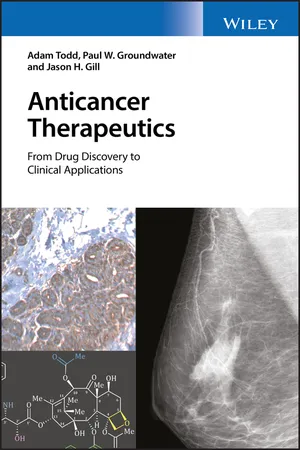
Anticancer Therapeutics
From Drug Discovery to Clinical Applications
- English
- ePUB (mobile friendly)
- Available on iOS & Android
Anticancer Therapeutics
From Drug Discovery to Clinical Applications
About This Book
An integrated presentation of the basic science and clinical applications of anticancer agents
Aimed at both undergraduate and postgraduate readers, this unique text provides readers with a fully-integrated presentation of all aspects of the science of anticancer drugs, including their chemistry, pharmacology, and clinical applications.
After heart disease, cancer is the number one killer worldwide, and the tumor microenvironment is forever changing, creating an ever-greater demand for safer, more effective anticancer agents. In response to that demand, the $100 billion cancer drug market continues to grow, with our increased understanding of cancer leading to new drugs being used clinically almost every year.
Anticancer Therapeutics is divided into three sections. Section 1 is an introduction to cancer and therapeutics, and covers the etiology and cellular and molecular basis of cancer. In Section 2, the authors focus on the anticancer agents — their discovery, synthesis, mode of action, mechanisms of resistance, and adverse reactions. Section 3 focuses on specific cancers, explaining how and why the various agents discussed in Section 2 are used, both individually and in combination, to treat different cancers.
- Integrates aspects of basic science, including chemistry and pharmacology and clinical medicine in relation to cancer therapeutics
- Written by an author team comprising specialists in medicinal chemistry, pharmacology, and oncology
- Features full-color images throughout illustrating how drugs bind to cellular targets and exert their pharmacological effect
- Divided into three sections, covering the etiology and cellular and molecular basis of cancer, anticancer agents, and drug applications for different cancers.
Providing the reader with an integrated understanding of all aspects of the science of anticancer agents, this is an ideal textbook for undergraduates studying medicine, nursing, medicinal chemistry, pharmacy, pharmacology and other allied heath / life sciences. It is also a valuable bench reference for pharmacists, medics, and pharmaceutical researchers working in both academia and industry.
Frequently asked questions
Information
Table of contents
- Cover
- Title Page
- Table of Contents
- Preface
- Section 1: Introduction
- Section 2: The Anticancer Agents
- Section 3: The Cancers
- Index
- End User License Agreement